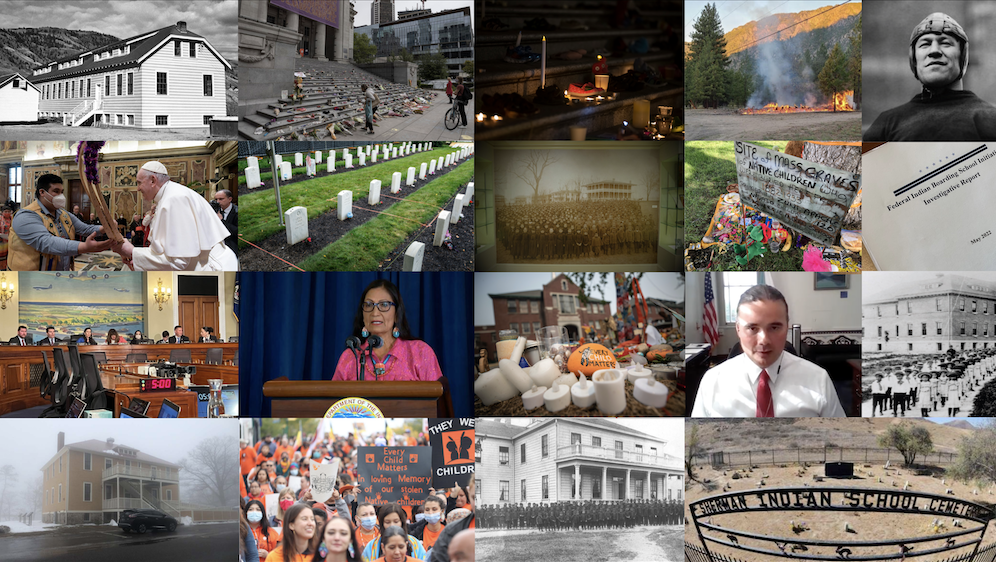
- Details
- By Native News Online Staff
Your questions about Indian Boarding Schools, as answered by our team.
How did Indigeneous people find healing in their families and communities? Did they remain silent or did they tell their children,their relatives, their parents? Thanks so much for sharing for the rest of us.
This is the million dollar question, one that has a different answer and meaning for each survivor who experienced Indian boarding school. On the whole, our reporting has shown that many survivors never or rarely spoke of their boarding school experiences to their children or family members, especially when that experience was largely negative. It's also important to keep in mind that children who attended boarding schools were very often the second or third generation to do so.
The Federal Indian Boarding School Initiative investigation demonstrates that “children of the first attendees of [Federal Indian] boarding schools went on to attend, as did their grandchildren, and great grandchildren leading to an intergenerational pattern of cultural and familial disruption under direct and indirect support by the United States and non-Federal entities.”
One survivor of a boarding school on the Rosebud Indian Reservation in South Dakota, Duane Hollow Horn Bear, told us he found healing by finding his way back to his spirituality and his culture. Others have had different experiences.
The aim of the Federal Indian Boarding School Initiative and Deb Haaland’s Road to Healing is to help define and facilitate what healing looks like in each community.
“Until we hear our communities speak their experiences, that will define our next steps,” Native American Boarding School Healing Coalition President Sandy Whitehawk responded to a question about what comes next in a Senate Hearing on Federal Indian Boarding Schools on June 22.
Read previous Q & As on Indian Boarding Schools
Readers Ask Us 1, June 7th
Readers Ask Us 2, June 10
Readers Ask Us 3, July 21
Readers Ask Us 4, August 1
If you have a question about Indian Boarding Schools, please submit them to [email protected] or use the online form that can be found at the bottom of stories such as this one. Want to help us shine a light on the dark era of Indian Boarding Schools and their continued impact on Native families and communities today? Become a recurring donor for $5 or $10 a month, or make a one-time donation.
More Stories Like This
Native News Weekly (August 25, 2024): D.C. BriefsUS Presidents in Their Own Words Concerning American Indians
Next on Native Bidaské: Julian Brave NoiseCat on the Lumbee Nation’s 140-Year Fight for Federal Recognition
Hackers Compromise Native News Online Facebook Page
‘His stories can no longer be told.’ | Woman Pleads Guilty to 2016 Murder of Indigenous Master Woodcarver
Help us defend tribal sovereignty.
At Native News Online, our mission is rooted in telling the stories that strengthen sovereignty and uplift Indigenous voices — not just at year’s end, but every single day.
Because of your generosity last year, we were able to keep our reporters on the ground in tribal communities, at national gatherings and in the halls of Congress — covering the issues that matter most to Indian Country: sovereignty, culture, education, health and economic opportunity.
That support sustained us through a tough year in 2025. Now, as we look to the year ahead, we need your help right now to ensure warrior journalism remains strong — reporting that defends tribal sovereignty, amplifies Native truth, and holds power accountable.
 The stakes couldn't be higher. Your support keeps Native voices heard, Native stories told and Native sovereignty defended.
The stakes couldn't be higher. Your support keeps Native voices heard, Native stories told and Native sovereignty defended.
Stand with Warrior Journalism today.
Levi Rickert (Potawatomi), Editor & Publisher

